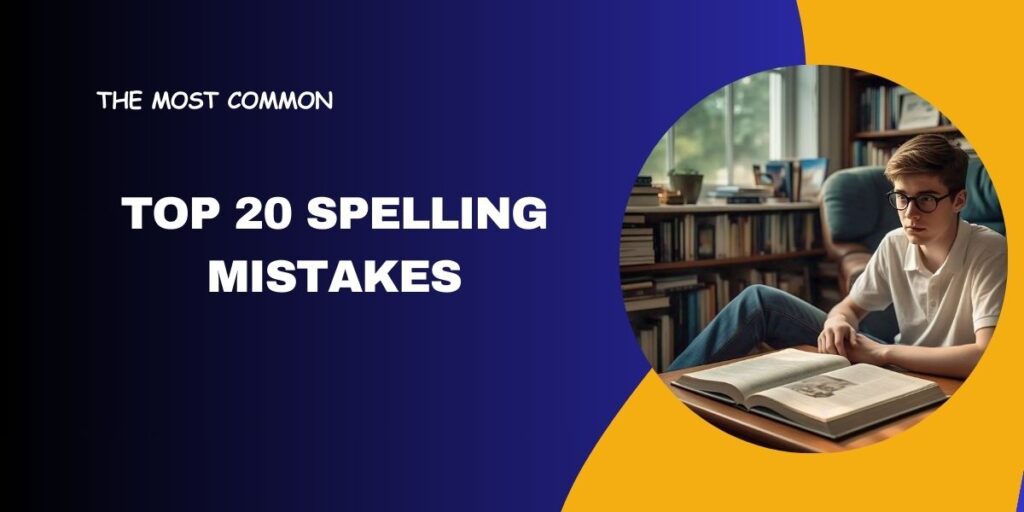Top 20 Spelling Mistakes and How to Avoid Them
Spelling mistakes can be embarrassing, whether they appear in an email, resume, or social media post. In today’s digital world, where written communication is essential, mastering correct spelling is more important than ever. This article highlights 20 spelling mistakes that people often make, provides examples, and offers practical tips for avoiding them.

Why do spelling mistakes occur?
Before we get into the list, let’s understand why spelling mistakes happen. Common reasons include:
- Homophones: Words that sound the same but have different meanings and spellings (for example, “them” vs. “there”).
- Typographical errors: Hasty typing can lead to common errors.
- Reliance on autocorrect: Relying too much on technology can result in overlooking errors.
- Lack of familiarity: Some words are just hard to spell.
Top 20 Spelling Mistakes
Now, let’s explore the top 20 spelling mistakes and how you can fix them.
- Their vs. There vs. They are.
- Example mistake: going to their store.
- Correct usage: They are going to the shop.
- Tip: Remember “their” indicates possession, “there” refers to place, and “they’re” is a contraction of “they’re.”
- You vs. You
- Example error: You are welcome.
- Correct usage: You are welcome.
- Tip: Use “you are” when you mean “you are.”
- This vs. That
- Example error: It is raining outside.
- Correct usage: It is raining outside.
- Hint: “It’s” is short for “it’s” while “its” shows possession.
- Impact vs. Effect
- Example error: The weather affected my plans.
- Correct usage: The weather affected my plans.
- Hint: “Effect” is usually a verb, and “impact” is usually a noun.
- Lose vs. Lose
- Example mistake: Don’t lose your keys.
- Correct use: Don’t lose your keys.
- Tip: Remember, “loose” refers to something that is not tight, while “loose” means misplaced.
- Then vs Than
- Example error: I would rather eat pasta than pizza.
- Correct usage: I would rather eat pizza than pasta.
- Tip: Use “than” for comparison and “then” for order.
- Certainly vs. definitely
- Example error: I definitely need a vacation.
- Correct usage: I definitely need a vacation.
- Tip: Break it down: “defi” + “nitely.”
- Separate vs. Separate
- Example error: Please separate the documents.
- Correct usage: Please separate the documents.
- Hint: Think of the “rat” in the middle of “separate”.
- Definition vs. Complement
- Example mistake: That scarf really compliments your outfit.
- Correct use: That scarf really complements your outfit.
- Hint: “Complement” refers to something that goes well with something else.
- Allot vs. a lot
- Example error: I have too many tasks.
- Correct usage: I have a lot of work to do.
- Hint: “A lot” is always two words.
- He/She vs. Himself
- Example error: They did it themselves.
- Correct usage: They did it themselves.
- Tip: “Self” is not a word. Always use “yourself.”
- Principal vs. Principle
- Example error: She is a woman of strong principal.
- Correct usage: She is a woman of strong principles.
- Tip: “Principal” refers to a school leader or something important, while “principle” means a fundamental truth.
- Weather vs. Whether
- Example error: I’m not sure I should go to the weather.
- Correct usage: I’m not sure whether I should go or not.
- Hint: “Weather” refers to environmental conditions, while “whether” is used for choices.
- Accept vs Except
- Example error: I can’t do anything other than this gift.
- Correct usage: I cannot accept this gift.
- Hint: “Accept” means to receive, and “except” means to exclude.
- Stationary vs. Stationary
- Example error: I bought some stationery for my office.
- Correct usage: I bought some stationery for my office.
- Tip: Remember, “e” for envelopes and paper.
- Who vs. Whose
- Example error: Who is coming to dinner?
- Correct usage: Who is coming to dinner?
- Hint: “Whose” is a contraction of “whose” and “whose” indicates possession.
- Two vs. Many
- Example error: I am also going to the store.
- Correct usage: I am going to the shop.
- Tip: Use “too” when you mean “also” or “more than.”
- Lie vs. Let
- Example error: I’m going to lie down.
- Correct usage: I am going to lie down.
- Tip: Use “lie” when something is not included and “let” when something is present.
- Desert vs. Dessert
- Example error: I would like some desert after dinner.
- Correct usage: I would like something sweet after dinner.
- Tip: “Dessert” has an extra “s” because it is sweet.
- Advice vs. Advice
- Example error: Can you give me some advice?
- Correct usage: Can you give me some advice?
- Hint: “Advice” is a noun, while “advice” is a verb.
Tips to avoid spelling mistakes
- Use spell check tools: Software like Grammarly and built-in spell checkers can help.
- Proofread: Always double-check your writing.
- Learn the general rules: Familiarize yourself with spelling rules and exceptions.
- Practice regularly: Reading and writing improves your spelling over time.
- Use mnemonics: Memory aids can make it easier to remember difficult words.
